Key takeaways:
- Plastic waste has a long-lasting impact on ecosystems and human health, with microplastics entering the food chain.
- Ocean conservation is critical for climate regulation, biodiversity, and the livelihoods of millions relying on marine resources.
- Small, community-driven actions and individual lifestyle changes can effectively reduce plastic use and promote environmental awareness.
- Engaging others through personal stories and social media can inspire collective efforts to combat plastic pollution.
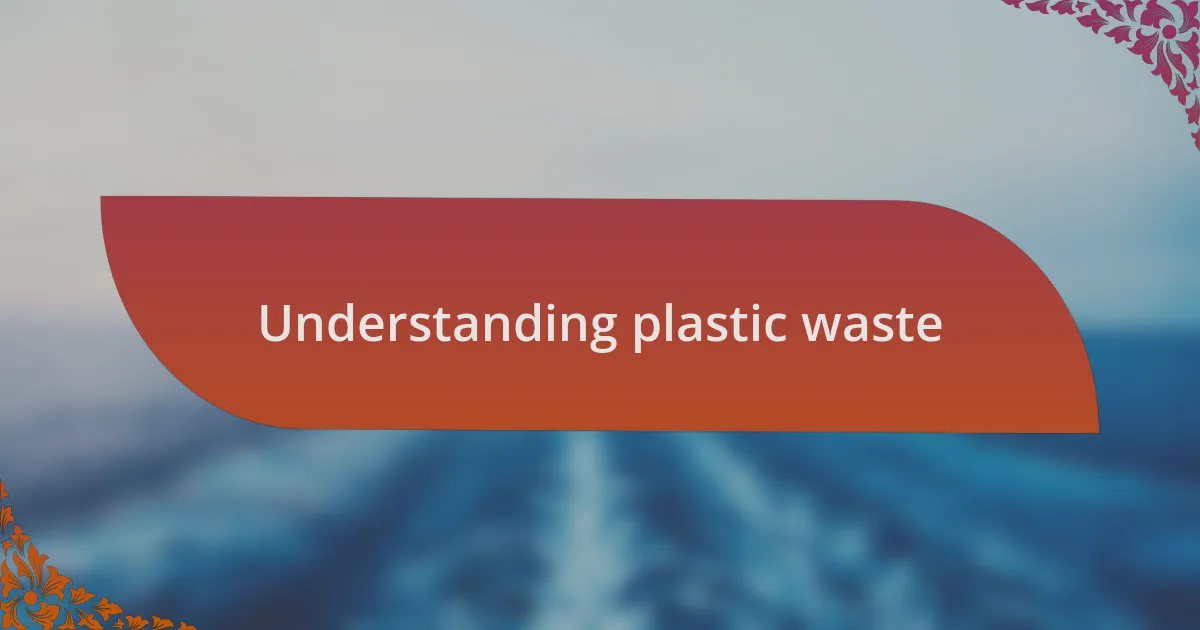
Understanding plastic waste
Plastic waste is a significant problem we face today, and it often feels overwhelming. I still remember my first encounter with plastic pollution while hiking along a once-pristine beach; the sight of litter scattered across the sand made my heart sink. How did we let this happen?
Every piece of plastic we use has a lifespan of hundreds of years, yet we often use it for mere minutes. I’ve found myself guilty of grabbing a plastic bag for convenience, but each time I do, I reflect on the long-term impact it has on our oceans. Isn’t it surprising that a simple choice can contribute to such lasting damage?
When plastic eventually breaks down, it doesn’t disappear; it fragments into smaller microplastics that infiltrate our ecosystems. One day, after learning about the food chain’s disruption, I became anxious about what I was consuming. Are we truly aware of how entwined our lives are with plastic? It’s a haunting realization that compels me to act.
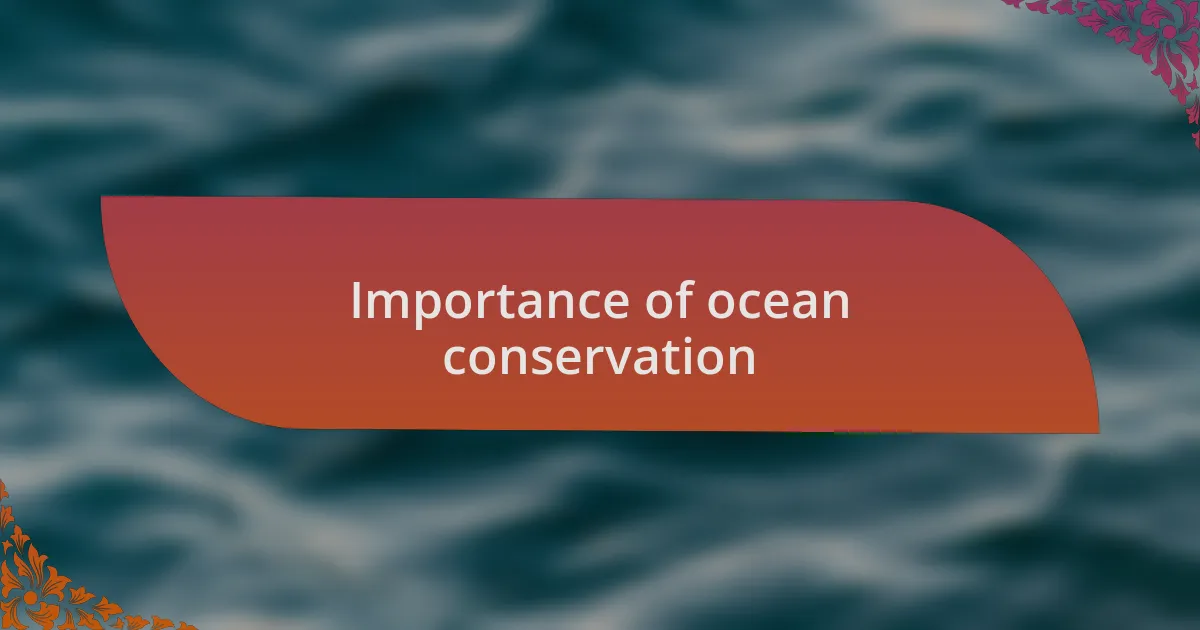
Importance of ocean conservation
The health of our oceans is crucial not just for marine life but for humanity as well. I remember diving into the clear waters of a tropical reef, mesmerized by the vibrant colors and diversity below. That experience drove home the reality that these ecosystems are vital for our oxygen supply and climate regulation. If we don’t prioritize ocean conservation, what will happen to these underwater havens and the life they support?
Healthy oceans are indispensable in combating climate change, acting as significant carbon sinks that absorb excess CO2 from the atmosphere. I often think about my own carbon footprint and how every little action contributes to a larger outcome. But are we taking enough responsibility? The thought that our oceans, which have given us so much, might suffer irreparably due to our negligence is distressing.
Moreover, the ocean is a source of livelihood for millions of people around the world, providing food, jobs, and recreational opportunities. I’ve met fishermen whose families have fished those waters for generations, but now they struggle against overfishing and pollution. Can we afford to allow such traditions to fade away? Protecting our oceans is, ultimately, about preserving our heritage and ensuring a sustainable future for generations to come.
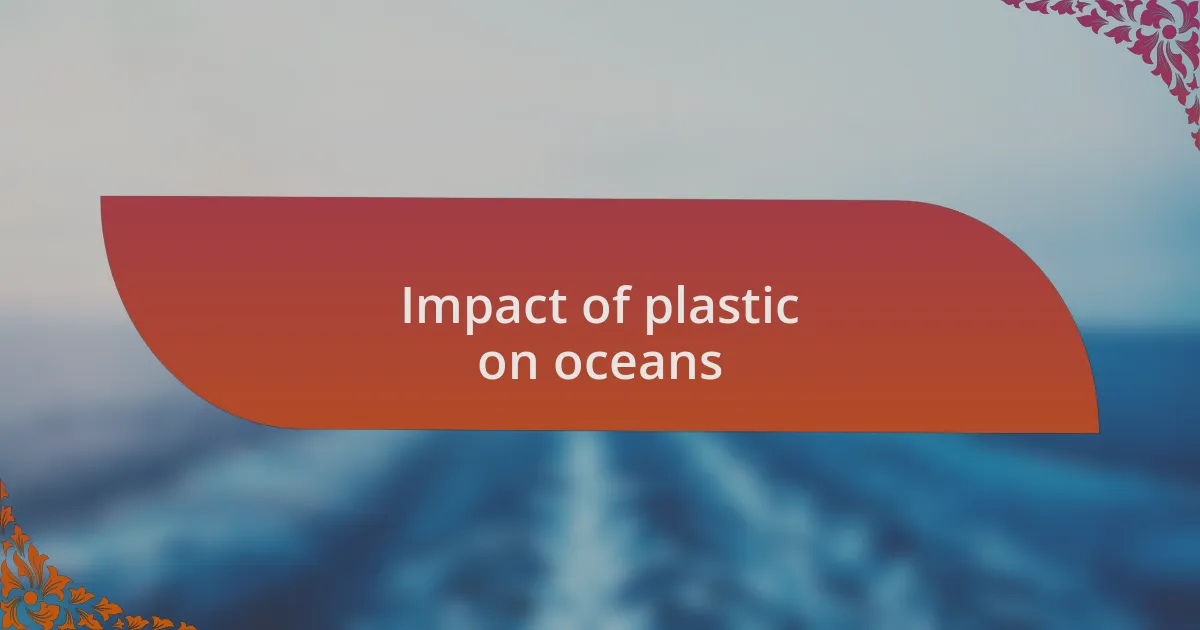
Impact of plastic on oceans
Plastic pollution has infiltrated the deepest parts of the ocean, negatively impacting marine life and ecosystems. I vividly recall a beach cleanup that I participated in, where we collected not just bags but entire nets of plastic debris. It was heartbreaking to see how these items, once common in our households, had transformed into lethal hazards for sea creatures.
Every year, millions of marine animals are reported to ingest or become entangled in plastic waste. I once watched a documentary that showcased the effects of microplastics—tiny plastic fragments that make their way into the food chain. It left me wondering, how many fish were unwittingly feeding on these particles before they ended up on our dinner plates? The thought of plastic contaminating our food supply is unsettling and makes the urgency for action crystal clear.
Moreover, plastics break down into smaller particles, suffocating coral reefs and disrupting habitats. I remember visiting a coral reef that was starting to show signs of plastic smothering its colorful corals. Could we bear to lose such wonders, not just for their beauty but for their role in marine biodiversity? Every piece of plastic that ends up in the ocean diminishes the staggering beauty and complexity of underwater life, making it essential for us to reconsider our relationship with single-use plastics.
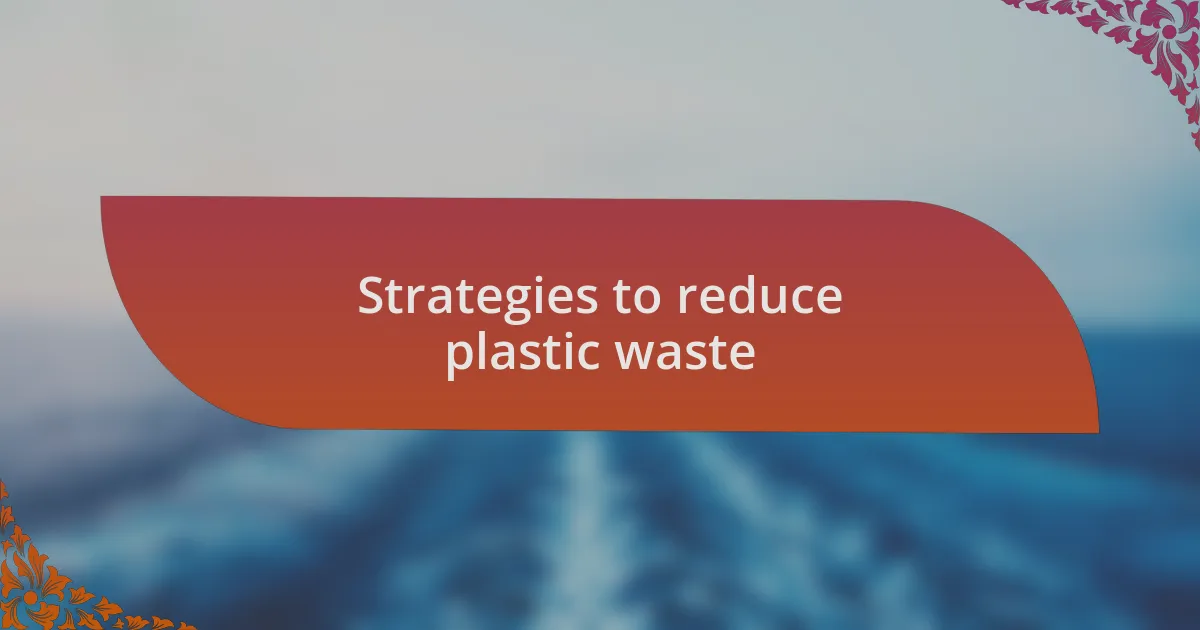
Strategies to reduce plastic waste
To effectively tackle plastic waste, I’ve found that one of the most powerful strategies is to replace single-use items with reusable alternatives. For example, when I started using a stainless steel water bottle instead of plastic ones, it wasn’t just a small change—it became a habit that inspired others around me. Have you ever noticed how small actions can create a ripple effect in your community?
Another strategy that’s made a significant difference in my life is advocacy for better policies surrounding plastic production. Attending local town halls and pushing for bans on plastic bags and straws made me realize the power of collective action. Each time I engage with the topic or share my experiences with friends, it feels like I’m contributing to a larger movement. Isn’t it empowering to think that our voices can lead to meaningful change?
Lastly, I’ve started composting and choosing products with minimal packaging. Not only does this reduce waste, but it’s also been eye-opening to realize how much excess packaging is typically used. Have you considered the impact of the items you buy? I’d encourage you to take a moment to evaluate your purchases; small adjustments can lead to significant improvements in reducing our plastic footprint.
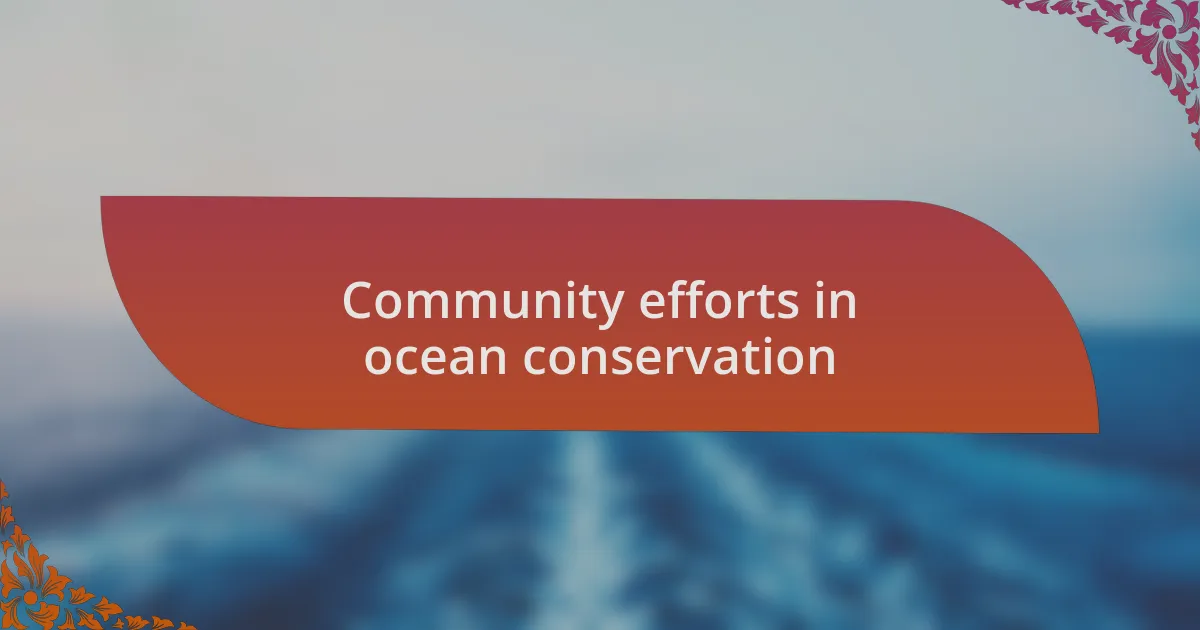
Community efforts in ocean conservation
Engaging in community clean-up events has become one of my favorite ways to contribute to ocean conservation. I remember my first beach clean-up; I was shocked to see how much plastic waste washed ashore, a stark reminder of our consumption habits. It felt good to work alongside others who shared my passion, and witnessing the immediate impact of our efforts was deeply rewarding. Have you ever participated in something like that?
Another experience that stands out to me is when my local community organized an educational workshop on the effects of plastic pollution. It was enlightening to hear from marine biologists about how plastic affects marine life, and it sparked vital conversations among attendees. I left feeling inspired and motivated, realizing how essential it is to raise awareness in our neighborhoods. Have you shared what you’ve learned about plastic waste with others?
I’ve also noticed how local businesses are stepping up to support environmental initiatives, creating a network of change. For instance, a nearby café recently started offering discounts for customers who bring their own containers. It struck me how a simple incentive can foster a culture of sustainability. Seeing others embrace these changes makes me hopeful for the future. Isn’t it reassuring to know that collective efforts can lead to a cleaner, healthier ocean?
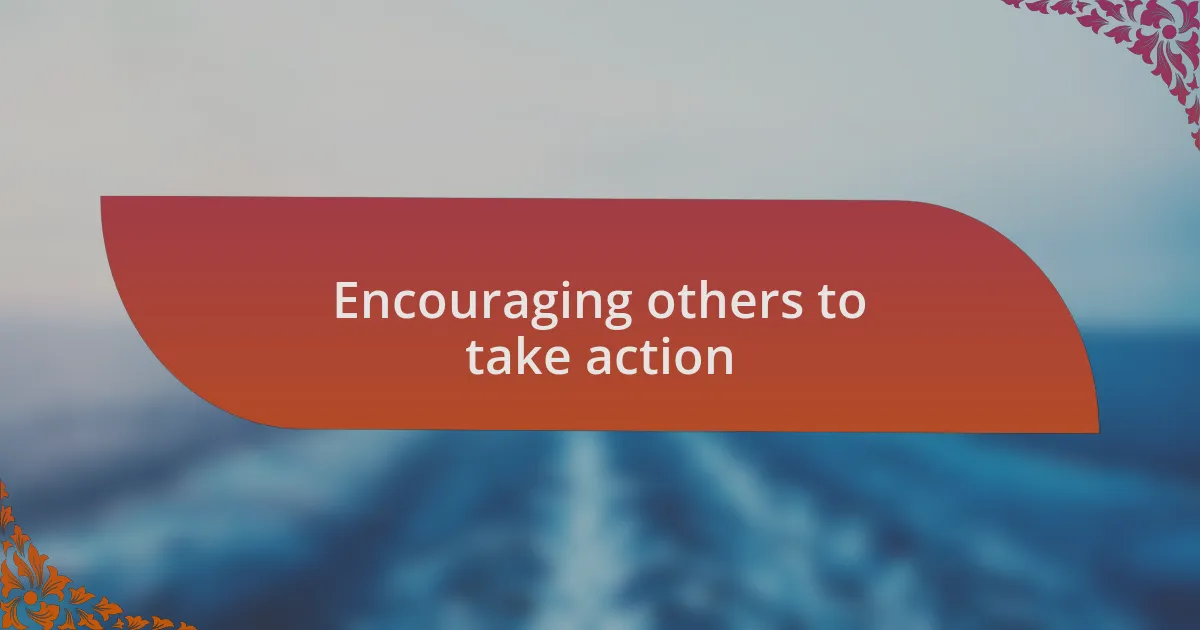
Encouraging others to take action
Encouraging others to take action can often feel like a daunting task, yet my experience has shown me that small, personal interactions can spark significant change. I remember sharing my journey of reducing plastic waste with a close friend over coffee. To my surprise, she was motivated to swap her single-use plastic items for sustainable alternatives. Isn’t it fascinating how one conversation can lead to a ripple effect?
I’ve had great success by leveraging social media as a platform to share my efforts. Posting before-and-after photos of my zero-waste journey led to engaging discussions with followers, many of whom reached out to ask for tips. It made me realize that transparency in my process, including my struggles and successes, resonates deeply with others. How have you used your own platforms to inspire change?
One impactful initiative I took was organizing a local challenge, where friends competed to minimize their plastic use for a month. The excitement was palpable, and soon we were exchanging ideas and celebrating our victories. It was incredible to watch as everyone became more conscious of their habits. Just imagine if we expanded this effort to our neighborhoods—how much more significant could our impact be?